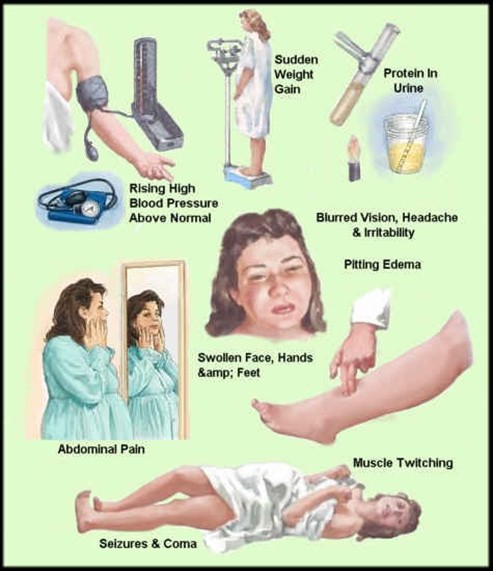A nurse is providing teaching to a client who is at 14 weeks of gestation about findings to report to the provider.
Which of the following findings should the nurse include in the teaching
Bleeding gums
Urinary frequency
preeclampsia
faintness upon rising
The Correct Answer is C
This is a sign of preeclampsia, a serious complication of pregnancy that can cause high blood pressure, proteinuria, and seizures.

Preeclampsia can affect the placenta, the kidneys, the liver, and the brain of the mother and the fetus. It requires immediate medical attention and may lead to early delivery.
Choice A, bleeding gums, is wrong because it is a common occurrence during pregnancy due to hormonal changes that increase blood flow to the gums. It is not a cause for concern unless it is excessive or accompanied by other symptoms.
Choice B, urinary frequency, is wrong because it is also a normal finding during pregnancy due to the growing uterus putting pressure on the bladder. It is not a sign of infection or kidney problems unless it is associated with pain, burning, or blood in the urine.
Choice D, faintness upon rising, is wrong because it is usually caused by orthostatic hypotension, a drop in blood pressure when changing positions.
This can happen during pregnancy due to the dilation of blood vessels and the increased blood volume. It can be prevented by rising slowly, drinking enough fluids, and avoiding prolonged standing.
Nursing Test Bank
Naxlex Comprehensive Predictor Exams
Related Questions
Correct Answer is C
Explanation
- . Answer and explanation.
The correct answer is choice C, first-degree atrioventricular block.
This is because the PR interval is longer than normal, which indicates a delay in the conduction of electrical impulses from the atria to the ventricles through the AV node. A normal PR interval is 0.12 to 0.2 seconds, or 3 to 5 small squares on the EKG strip.
In this case, the PR interval is 0.35 seconds, which is more than 5 small squares.
Choice A is wrong because atrial fibrillation is a type of arrhythmia where the atria beat irregularly and rapidly, producing chaotic and variable P waves and an irregular ventricular response.
There is no constant PR interval in atrial fibrillation.
Choice B is wrong because complete heart block is a type of arrhythmia where there is no conduction of electrical impulses from the atria to the ventricles, resulting in independent and dissociated atrial and ventricular rhythms.
There are no consistent P waves or PR intervals in complete heart block.
Choice D is wrong because premature atrial complexes are extra beats that originate from the atria and interrupt the normal sinus rhythm.
They produce abnormal P waves that are different from the sinus P waves, and may have a shorter or longer PR interval depending on the timing of the impulse.
However, they do not cause a constant prolongation of the PR interval.
Correct Answer is B
Explanation
The correct answer is choice b. "I can start the medication 30 minutes earlier."Choice A rationale: This is an inappropriate response, as the nurse should not adjust the time and schedule for the administration of alteplase recombinant, which is a time-sensitive medication used to treat a thrombus in the coronary artery. The administration of this medication must be done within a specific time frame to be effective.Choice B rationale: This is the correct answer. Alteplase recombinant is a thrombolytic medication used to dissolve blood clots in the coronary artery. It is a time-sensitive medication, and it is crucial to administer it as soon as possible to minimize the damage to the heart muscle. Starting the medication 30 minutes earlier is an appropriate action to include in the plan of care, as it can help ensure the medication is administered within the recommended time frame.Choice C rationale: This is an inappropriate response. Alteplase recombinant should be administered within a specific time frame, typically within 3 to 4.5 hours of the onset of symptoms. Waiting up to 2 hours after the usual schedule time to give the medication would be outside the recommended time frame and could potentially reduce the effectiveness of the treatment.Choice D rationale: This is an inappropriate response. Alteplase recombinant should be infused at a specific rate, as recommended by the manufacturer or healthcare provider. Infusing the medication at a faster rate could increase the risk of adverse effects and should not be included in the plan of care without specific instructions from the healthcare provider.
Whether you are a student looking to ace your exams or a practicing nurse seeking to enhance your expertise , our nursing education contents will empower you with the confidence and competence to make a difference in the lives of patients and become a respected leader in the healthcare field.
Visit Naxlex, invest in your future and unlock endless possibilities with our unparalleled nursing education contents today
Report Wrong Answer on the Current Question
Do you disagree with the answer? If yes, what is your expected answer? Explain.
Kindly be descriptive with the issue you are facing.
